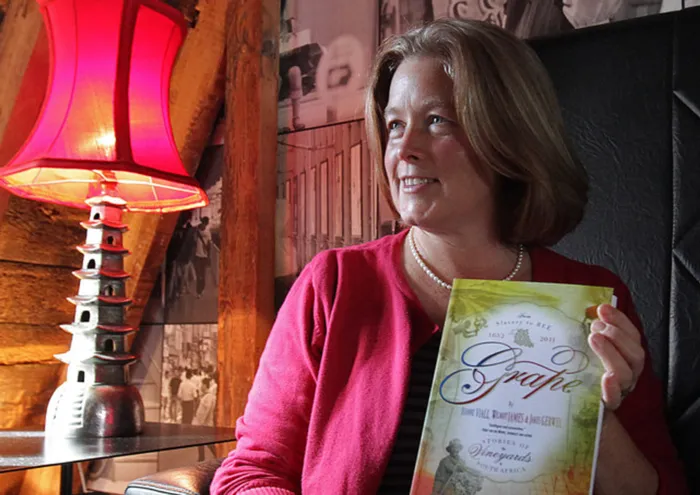The people behind the wine

Grape, co-written by Jeanne Viall, above, Wilmot James and Jakes Gerwel, is a story of 'the people who came to be known as coloureds'. Grape, co-written by Jeanne Viall, above, Wilmot James and Jakes Gerwel, is a story of 'the people who came to be known as coloureds'.
Many journalists fondly imagine they have a book in them, which will be written as soon as they have the time.
But few find the time, which is probably a good thing.
However, that’s not true of former Cape Argus reporter Jeanne Viall, whose gardening feature still appears once a month in this newspaper.
Viall knew little about gardens when she began the feature, but was persuaded that a good reporter could extract value from a good interview subject without being an expert herself.
And this may have had some bearing on her willingness to research and write Grape – Stories of Vineyards in South Africa (Tafelberg), which has been co-authored with DA MP Wilmot James and academic Jakes Gerwel.
For Viall was never much of a wine fundi or even a wine drinker, but what she has always been good at is human stories, and it is the human stories of ordinary vineyard workers that she has tried to extract and present in this volume.
At the launch in Cape Town last week she said: “For me it was always about the stories of the people. I didn’t have a passion for history when I started – I do now – and the challenge was to find the stories, find out what it was like to be a worker or a slave on a wine farm. The trouble is, they didn’t have a voice.
“Histories of wine estates told you lots about the mostly white owners, but very little about the people working on the farms.
“So we went out and talked to people, and met some feisty people, mostly women.
“This book has provided an opportunity to delve into an aspect of history I’d known very little about, and the chance to give a voice to people. It was a fascinating book to write.”
While Viall might have been responsible for the research and the writing, the idea came from James and Gerwel who had both been wanting to tell the history of “the people who have come to be known as ‘coloured’ people, without being ethnic or sectarian, and without casting their history as a perpetual state of pathology or victimhood’,” as they say in the foreword.
“We couldn’t figure out how to do it,” said James.
Then, while attending a conference at Harvard, his daughter took him to the cookery section of a bookshop, where he came across a history of the potato, which was in fact a history of the Irish famine and Irish emigration to the US.
Books like that, or on the history of cod or the history of the olive, have been a way of getting into a particular social history, and it occurred to James that a history of the grape in South Africa could achieve the same end for South Africa.
The story of the grape also told the story of people who were here before the first vineyards were planted, the story of the settlers and those who came to the Cape as slaves. There were also the stories of those who developed the wine industry and took risks to create a viable industry.
The theme created the opportunity to look at aspects like land and housing, labour shortages, alcohol abuse and the dop system, foetal alcohol syndrome, the tough economic conditions affecting the industry and the effects of climate change.
But as Viall says, stories of ordinary people are at the heart of the book. There are the Cysters of Pniel, some of whom were classified white during the apartheid years, who bought land from a local farmer called Hoeft that is still known as the Cystergronde.
There is the story of the Muslim community of Mosterd Bay, now the Strand, whose numbers swelled when the slaves were emancipated because Islam was an alternative religion to that of their former owners.
There is the story of Willie Venneal, now an old man. His father worked at Boschendal, but when he joined the army in World War II, Willie, just 11, had to leave school to work to secure a house for the family.
And there’s the story of Ntsiki Biyela, winemaker at Stellekaya, who studied at Stellenbosch and who is probably the first black woman winemaker who can’t speak Afrikaans.
If people won’t speak English to her, she switches to Zulu. Her philosophy is: “I don’t speak your language, you don’t speak mine, let’s find middle ground.”
As Gerwel pointed out at the launch, despite our differences and inequalities, South Africans live within a common economy that binds us. We all need a middle ground where we can connect, and perhaps this book, with its many South African stories, can help us find it.